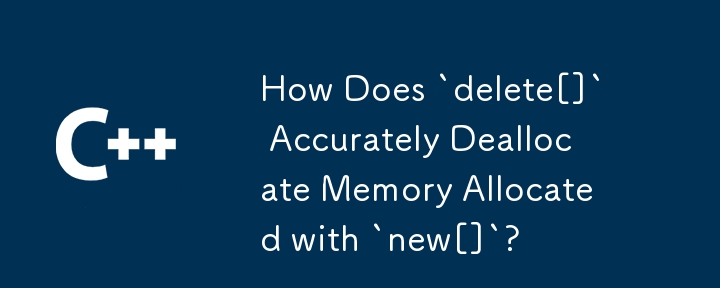Found a total of 10000 related content

Memory allocation of golang function
Article Introduction:In Go, memory allocation for functions is handled by the automatic memory management system, eliminating the need to manually allocate or free memory. The memory allocation model includes stack and heap, and the garbage collector automatically reclaims memory space that is no longer used. Manual allocation of memory can be achieved through the new and make functions. In practical cases, by optimizing the memory allocation of complex functions, using pre-allocated slices can reduce the number of memory allocations and improve function performance.
2024-04-19
comment 0
498

Memory allocation method for C++ function pointer parameters
Article Introduction:Function pointer parameters in C++ can be allocated using two memory allocation methods: dynamic allocation or static allocation. Dynamic allocation uses heap memory, allocating and releasing memory at runtime; static allocation uses stack memory, and allocates memory at compile time.
2024-04-20
comment 0
1095

Golang function memory allocation principle
Article Introduction:In Go, function memory allocation is divided into stack allocation and heap allocation. Stack allocation is used for function parameters and local variables, and the life cycle is bound to the function execution cycle. Heap allocation is used for pointer type allocation, which is managed by the garbage collection mechanism and will not be automatically released even if it goes out of scope. Understanding memory allocation principles can help optimize memory usage, avoid memory leaks, and debug memory management problems.
2024-04-23
comment 0
665

Memory Allocation in Java
Article Introduction:Guide to Memory Allocation in Java. Here we discuss how memory allocation is achieved in java with the help of stack and heap memory.
2024-08-30
comment 0
640

How memory allocation works on Linux
Article Introduction:It is important to understand the details of Linux memory allocation, especially in the kernel and system architecture. Let’s take a deep dive into Linux memory allocation and understand what’s happening behind the scenes. In a computer, for a process to be executable, it needs to be placed in memory. To do this, the field must be allocated to the process in memory. Memory allocation is an important issue to pay attention to, especially in the kernel and system architecture. Let’s take a closer look at Linux memory allocation and understand what happens behind the scenes. How is memory allocation done? Most software engineers don't know the details of this process. But if you are a systems programmer candidate, you should know more about it. When looking at the allocation process, it is necessary to do a little detail on the Linux and glibc libraries.
2024-02-10
comment 0
620

Free allocation memory mechanism in Go language
Article Introduction:Go language is a rapidly developing and popular programming language that has been widely used in many scenarios. Compared with some other languages, the Go language has a unique mechanism for memory management, which is a free memory allocation mechanism. This article will introduce the concept, principle and application of free allocation memory mechanism in Go language. 1. What is the free allocation memory mechanism? The free allocation memory mechanism refers to a mechanism that allocates memory resources autonomously when the program is running. When using the traditional memory management mechanism, the program needs to explicitly apply for memory space and
2023-06-01
comment 0
1510

Implement dynamic memory allocation in C++
Article Introduction:C++ is a high-level programming language that provides a variety of memory management methods, including static memory allocation and dynamic memory allocation. Static memory allocation allocates memory at compile time, while dynamic memory allocation allocates memory at runtime. In this article, we will focus on how to implement dynamic memory allocation in C++. 1. Use the new keyword to allocate memory. In C++, you can use the new keyword to dynamically allocate memory. The basic syntax of the new keyword is as follows: pointer variable = new data type; for example: int*
2023-08-22
comment 0
2303

Memcache memory allocation mechanism
Article Introduction::This article mainly introduces the Memcache memory allocation mechanism. Students who are interested in PHP tutorials can refer to it.
2016-08-08
comment 0
921

Memory allocation and recycling methods of Golang functions
Article Introduction:Golang is an object-oriented programming language with its own garbage collection mechanism, so memory allocation and recycling are easier than other languages. In Golang, functions can also allocate memory and recycle memory. This article will introduce in detail the memory allocation and recycling methods of Golang functions. 1. Memory allocation of functions When a function is declared, the program will allocate a memory for it to store the code and static variables of this function. When a function is called, the program allocates a stack memory to store the local variables of the call.
2023-05-16
comment 0
1738

C++ memory management: tracking memory allocation and deallocation
Article Introduction:C++ memory allocation and release tracking tools: The memory manager (such as the new and delete operators) is responsible for allocating and releasing memory. The debugger provides memory leak detection capabilities. 3. Third-party tool libraries (such as Valgrind and VTuneAmplifier) can help track memory usage.
2024-05-01
comment 0
766

C++ memory pool and early allocation to improve memory management performance
Article Introduction:Two techniques in C++ to improve memory management performance: Memory pool: Pre-allocate large blocks of memory and divide them into small blocks, providing fast allocation and release, reducing the overhead of interacting with the operating system. Advance allocation: Pre-allocate a large amount of memory when the program starts, avoiding the delay in requesting memory from the operating system and achieving rapid allocation.
2024-06-04
comment 0
740

Explain dynamic memory allocation in C language with an example
Article Introduction:Problem Programming in C, find the sum of n numbers entered by the user using dynamically allocated memory. Solution Dynamic memory allocation enables C programmers to allocate memory at runtime. The different functions we use to dynamically allocate memory at runtime include: malloc() - allocates a block of memory at runtime. calloc() - allocates contiguous blocks of memory at runtime. realloc() - used to reduce (or extend) allocated memory. free()-releases previously allocated memory space. The following C program is used to display elements and calculate the sum of n numbers. Using dynamic memory allocation functions, we try to reduce the waste of memory. Example Demo#include<stdio.h&am
2023-09-09
comment 0
720



A brief discussion on java memory allocation and recycling strategies
Article Introduction:1. Introduction
The automatic memory management mentioned in the Java technology system is ultimately two issues: memory allocation and recycling. I have talked to you about the knowledge of Java recycling before. Today, let's talk to you about the allocation of Java objects in memory. In layman's terms, the memory allocation of objects is the allocation on the heap. The objects are mainly allocated on Eden of the new generation (the generation of objects in memory will be supplemented during garbage collection. If you want to know more, you can also refer to "In-depth Understanding" Java Virtual Machine"), if the local thread allocation buffer is started, it will be allocated on the TLAB according to thread priority.
2017-06-26
comment 0
1173

C++ Memory Management: Memory Allocation Strategies
Article Introduction:In C++, choosing an appropriate memory allocation strategy is crucial to improving application performance and reliability. Common strategies include: 1. malloc/realloc: classic allocator that manages memory manually; 2. new/delete: C++ operator, which encapsulates malloc/realloc and automatically releases memory; 3. Smart pointers: avoid memory leaks and wild pointers ; 4. Memory pool: pre-allocate a fixed-size object group; 5. Garbage collection: automatically recycle objects that are no longer used (not commonly used in C++).
2024-05-02
comment 0
779

In C programming, what does static memory allocation mean?
Article Introduction:Memory can be allocated in two ways: Static memory allocation Static variables are defined in an allocated block of space with a fixed size. Once allocated, it cannot be released. Memory is allocated for declared variables in the program. You can use the "&" operator to get the address and assign it to the pointer. Memory is allocated at compile time. It uses the stack to maintain static allocation of memory. In this kind of allocation, once the memory is allocated, the memory size cannot be changed. Less efficient. The final size of the variable is determined before the program is run, this is called static memory allocation. Also known as compile-time memory allocation. We cannot change the size of variables allocated at compile time. Example 1 Static memory allocation is usually used for arrays. Let's do a sample program using an array as an example: Demonstration #include&l
2023-09-14
comment 0
1073

Memory allocation and avoiding memory waste in Go language
Article Introduction:With the continuous development of software development technology, the requirements for programming languages are becoming higher and higher. In addition to powerful functions and concise syntax, memory management and performance are also the focus of many developers. As a statically typed, compiled language, Go language has features such as fast compilation, efficient execution, and garbage collection. However, memory management has a huge impact on performance. How to allocate memory and avoid memory waste in Go also needs to be mastered. Key skills. 1. Memory allocation In the Go language, the memory of all variables is allocated on the heap.
2023-06-01
comment 0
1915

Memory management in C++ technology: How to optimize memory allocation strategy?
Article Introduction:Optimizing C++ memory allocation strategy is crucial, including choosing the appropriate allocator (new/delete, std::allocator, third-party allocator) and allocation strategy (heap allocation, stack allocation, object pool, slab allocator). Through optimization strategies, memory fragmentation can be reduced, program execution speed can be improved, and memory leaks can be avoided. In practice, object pools can effectively optimize the allocation of large numbers of objects. For example, preallocating MyClass objects can reduce fragmentation and overhead.
2024-05-07
comment 0
338


















